Meet Harry Beckwith: the Master of Simplicity
I spread stories of my fellow storytellers simply because I’m in awe of their art and the only way I can repay them is to share their art with others.
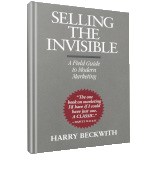 Mesmerized — It’s true, I quickly found myself feeling mesmerized with Harry Beckwith’s book Selling the Invisible. (A quick reminder: I already read his latest book titled Unthinking — see The New Beautiful.)
Mesmerized — It’s true, I quickly found myself feeling mesmerized with Harry Beckwith’s book Selling the Invisible. (A quick reminder: I already read his latest book titled Unthinking — see The New Beautiful.)
There’s a ton of useful ideas in Selling the Invisible, so don’t lend it to a friend—you’re unlikely to get it back.
Did I mention that I read the rest of his books?
I really like them all—see them all here.
Why?
How much time do I have?
Not much? Okay:
Harry offers simplicity in the world of complexity.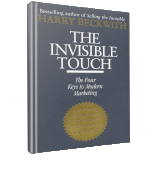
He is is a master of writing and teaching in a simple, yet profound manner.
Harry’s books are not about creating complex marketing plans.
Instead, Harry offers simple, clear and practical suggestions about how to get and keep customers.
After I finished reading Selling the Invisible, I had the pleasure of exchanging a few words with Harry and he graciously agreed to conduct a quick interview for sneezr.ca.
Jenan: Harry, judging from your books, you seem to believe that simplified communications win customers. What experiences have shaped this philosophy?
Harry: As with most people, my own strengths and weaknesses effect how I see the world. In this case, it’s my learning disability. I am not a gifted reader, and I get very impatient with bad writing–long and unclear sentences force me to look away.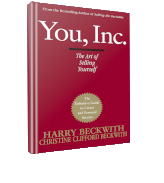
But my experiences every week continue to convince me that the only messages that penetrate and stick are simple. Our mind just cannot retain in memory a complicated message. We can remember “To err is human,” but only remember long messages if they’re contained in a melody that sticks in our mind.
And finally, we instinctively know that if you cannot communicate a message clearly and simply, you probably don’t really know what you mean, either.
Jenan: The relationship between simplicity and financial success isn’t always straightforward. Yet, there’s evidence, if you will, that some of the world’s most admired business leaders value simplicity. Consider Steve Jobs: No doubt, central to his success is his record of innovation. But his ability to communicate simply probably comes in as a close second.
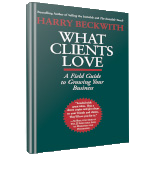
In your opinion, why is it that most business people do not seem eager to embrace simplicity in communications?
Harry: Because they assume that we are willing to sit there and read anything and everything that they say–that we’ll read a 400 word message on a home page. And they want to be sure to make every possible case that they can.
And not least of all, they aren’t well-trained writers. They don’t understand that shorter is better.
Jenan: Your new book entitled Unthinking offers a great collection of practical marketing principles, and almost every one of them is illustrated with an interesting story. My favourite part of your new book is called “What is beautiful to us.”
Here’s a little taste: “We call a person we think is complete `well-rounded’…
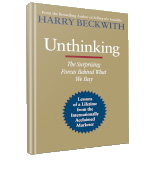 …The working space we most deplore is called a cube… We love the curve and dislike the edge.”
…The working space we most deplore is called a cube… We love the curve and dislike the edge.”
Harry, can you tell us about some other deep currents that tend to draw us in?
Harry: We love the genuine. I am amazed by how often I hear that word, or some variation on it–authenticity, for example.
We love stories. Stories are the vehicle through which we come, from childhood, to comprehend the world. It could be a fable, a fairy tale, The Little Engine that Could—any of these and more. And when a speaker tells a story, he learns that everyone listens intently. When you do that, you realize how hard-wired we are for narratives.
And as you suggest above, we are enchanted by beauty. Of course, I may be projecting a lot here, because I am enchanted by it. But we learn that with few exceptions–the ocean, for example–the beautiful is good for us, and safe.
Jenan: Thank you very much Harry for taking the time to answer my questions—all the best until next time!
July 20, 2011
